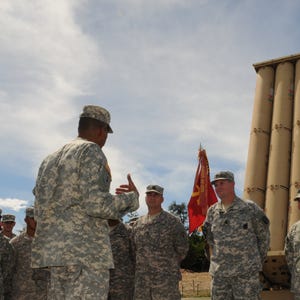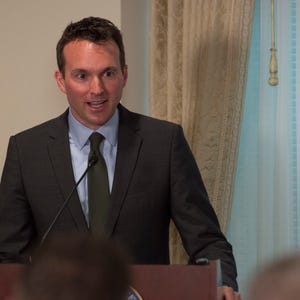Army Secretary Eric Fanning visited Guam for the first time Friday and looked at the Terminal High-Altitude Area Defense missile shield, which has been stationed at Andersen Air Force Base since North Korea made Guam-specific threats in 2013.
Placement of the THAAD battery will be key to what the Army’s presence will be like in Guam in the future, he said.
Other military service branches are also involved in the tightly integrated missile-defense efforts in Guam, Fanning said.
"We are rebalancing to the Pacific, so… even as we are drawing down in the Army, we are increasing the force structure in the Pacific, Fanning said.
The THAAD missile shield was initially stationed here temporarily, but the Defense Department last year announced it would be made permanent.
In his new role and in past civilian leadership roles with the Navy and Air Force, Fanning said he made it a point to visit Guam as part of an Asia-Pacific trip, not only because of Guam's strategic military importance, but also "because of the incredible commitment of the people of Guam to the military."
In addition to the THAAD, the U.S. Army has broader plans for Guam, laid out in a 2010 report.
That report states the Army plans to increase its presence by establishing an Army Missile Defense Task Force, which would increase the number of Army missile defense personnel from about 200 now, to 630 military personnel, 126 civilian support employees and 950 military dependents.
That broader plan was “on pause,” the military leadership had said last year, and wasn’t included in the military buildup plan that the Defense Department decided to move forwarded with, primarily for the construction of a Marine Corps base here.
On Friday, when Fanning was asked if the broader Army missile defense strategy for Guam was still under consideration, he said: “Everything is on the table."
“Missile defense involving all of the services, and really all of our installations in the Pacific, including Guam, is still a work in progress.”
Fanning was confirmed the Army’s top civilian boss in May this year, and National Public Radio and other national media organizations called his confirmation historic because he’s the first openly gay person to hold the job.
He also discussed, with Brig. Gen. Roderick Leon Guerrero, the adjutant general of the Guam National Guard, the Army’s new efforts to allow women in combat roles.
The Army is opening opportunities “as broadly as we can, and I think that’s a strength in the Army,” Fanning said.
People from different backgrounds, life experiences, training and education can strengthen the Army, as challenges grow more complex and technology changes quickly, he said.
“I want as many different perspectives, backgrounds thought processes as possible on the different set of problems we are facing,” Fanning said.
Leon Guerrero said the Guam Army National Guard is seeing increased interest among women to sign up for infantry roles.
Fanning also said mental health and behavioral health issues involving those who return from deployment with post-traumatic stress disorder, traumatic brain injury or other types of struggles are a priority for him.
The Army is conducting research internally and in partnerships with external experts and institutions to address this challenge, he said.
“We have to make sure we have services available at the right time, and that we are doing what we can to recognize anybody who is injured in any way, through service to their country, gets the help they deserve,” he said.
“We’ve learned a lot, but we have a long way to go.”



No comments:
Post a Comment